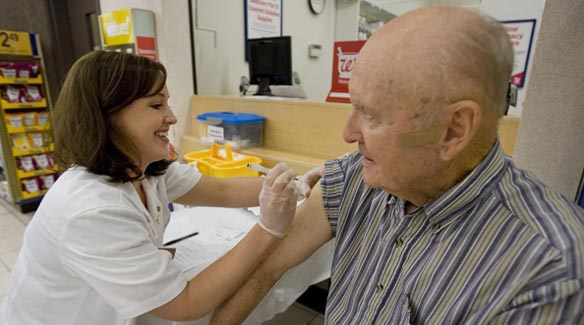SWINE FLU
H1N1 misconceptions
7 swine flu myths you should know about
Last Updated: Wednesday, December 16, 2009 | 3:49 PM ET
By Hiba Kesebi, CBC News
 Am I more likely to get swine flu if I get a seasonal flu shot? You'll have to read on to find out. (Mary Ann Chastain/Associated Press)
Am I more likely to get swine flu if I get a seasonal flu shot? You'll have to read on to find out. (Mary Ann Chastain/Associated Press) With public health officials expecting a second wave of the H1N1 virus to hit Canada hard this fall, some people are starting to panic about the possibility of catching swine flu. According to the World Health Organization the virus has resulted in 4,500 fatalities worldwide. However, with the regular flu season quickly approaching, that number is only expected to increase. Rumours about the virus are also starting to circulate making it, at times, difficult to distinguish between what's fact and what's fiction.
Here's a look at seven swine flu-related rumours.
Wash your hands with hot water to stop the spread of the virus.
True, frequent washing with soap and water is known to curb the spread of germs. The temperature of the water, however, makes no difference at all. In fact, a 2005 report in the Journal of Occupational and Environmental Medicine, found "no effect on transient or resident bacterial reduction" between people who washed their hands with temperatures ranging from 4.4-48.8 Celsius.
The call: When it comes to washing your hands, hot is no more effective than cold.
Avoid going out to public or crowded places
 Malaysians are seen wearing face masks on Penang Island, Malaysia. (Vincent Thian/Associated Press)
Malaysians are seen wearing face masks on Penang Island, Malaysia. (Vincent Thian/Associated Press)Although limiting your contact with people and staying away from crowded places will, of course, make you less likely to catch the virus, the U.S. Centers for Disease Control and Prevention says this step is not necessary. According to the group, it is safe to go outside — basic flu prevention precautions are sufficient to curb the virus for healthy people who are not at high risk of complications. These precautions include avoiding people who are sick and avoiding touching your eyes, nose or mouth.
The call: Taking basic precautions is enough to help prevent you from catching swine flu.
Wearing a face mask keeps you safe
The effectiveness of face masks for the average person is questionable. The general belief among experts is that getting vaccines and washing hands frequently is more successful in stopping the spread of swine flu — or any other flu — than wearing a mask. Ironically, wearing a mask can make you more likely to catch a virus because it provides you with a false sense of security, making you less likely to remember to wash your hands or take other preventive measures. They become effective, however, if you are the one who is sick. Wearing a mask while you're sick decreases the spread of airborne particles.
The call: Ditch the mask at home — unless you're the one who's sick.
If you get swine flu, rush to the ER
If your symptoms are mild, a trip to the emergency room will only have you put people at risk of catching the virus and expose you to other illnesses. The best thing to do if you have swine flu is to stay home, treat the symptoms and avoid infecting others. If you have risk factors or other medical problems then it's best you see a doctor right away.
You should seek immediate medical attention if your symptoms are severe and you are having difficulty breathing, pain in the chest, dizziness, severe vomiting, or flu symptoms that improve only to return with fever and a strong cough.
The call: If your symptoms are mild, fighting the flu at home is your best remedy.
Taking Tamiflu is a good preventive measure against the virus
If you do catch swine flu, then taking Tamiflu will help you fight off the virus. However, taking this medicine when you're not infected will only make your body, and the virus, more resistant to it.
The call: Avoid taking the medication, unless a doctor prescribes it to you.
It's better to get the H1N1 virus now, while the symptoms are mild, than risk catching it later or getting vaccinated.
Since many swine flu cases in the spring were mild, some parents decided to purposely have their child come in contact with someone infected by the virus. That way they would get sick, recover, and develop immunity on their own. That's not such a good idea, most health experts agree. That's because every person reacts to the H1N1 virus differently. For some it's not any different than the normal flu, but for others it could be fatal.
The call: Different people react differently to the virus. Always take precautions and don't try to get swine flu.
People vaccinated against the seasonal flu are more likely to catch the H1N1 virus
Although a Canadian study found that those who received vaccines for the seasonal flu are twice as likely to catch swine flu, other countries have not found similar results. According to Dr. Donald Low, medical director of laboratories for the Ontario Agency for Health Protection and Promotion, "What we're going to be facing now and over the next several months is H1N1, and so that's what you want to get vaccinated against."
The call: Canadian health-care professionals are recommending that people over the age of 65 get the seasonal flu vaccine — because it poses a bigger threat to their health than the H1N1 virus. For everybody else, it's the swine flu vaccine.
